人教版英语七年级下册Unit 12 What did you do last weekend. (Section B 2a-Self check)课件
文档属性
| 名称 | 人教版英语七年级下册Unit 12 What did you do last weekend. (Section B 2a-Self check)课件 |
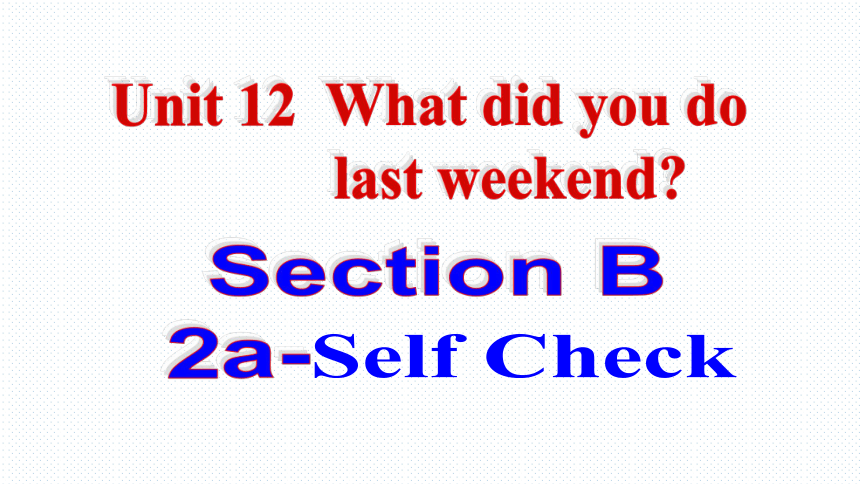
|
|
| 格式 | zip | ||
| 文件大小 | 2.1MB | ||
| 资源类型 | 教案 | ||
| 版本资源 | 人教新目标(Go for it)版 | ||
| 科目 | 英语 | ||
| 更新时间 | 2017-06-01 00:00:00 | ||
图片预览

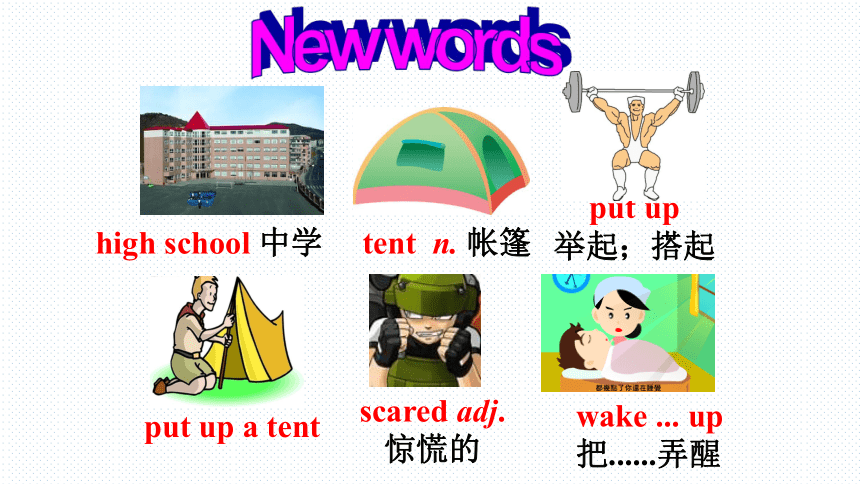
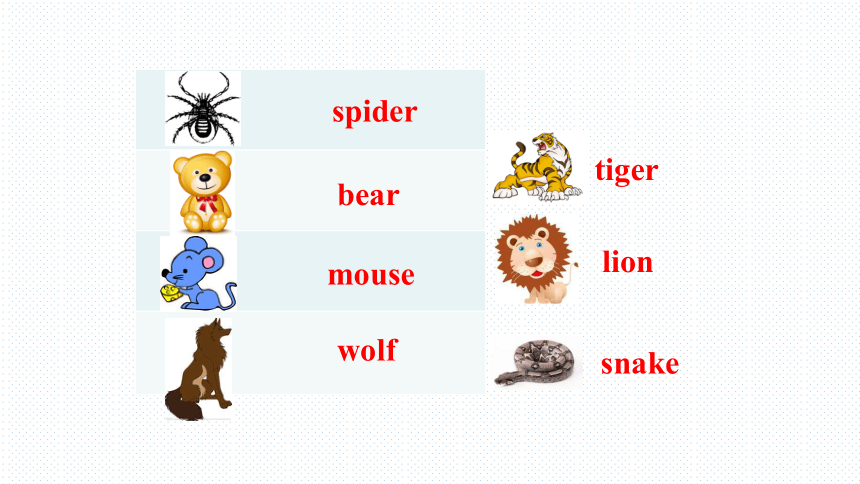
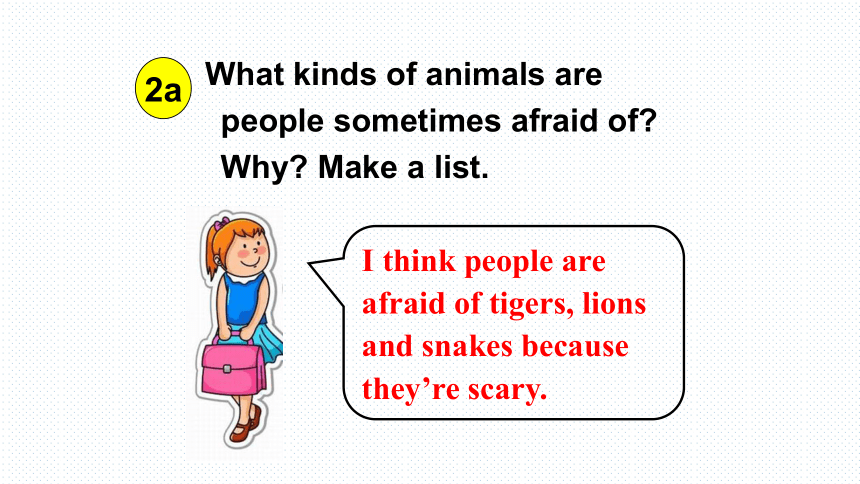
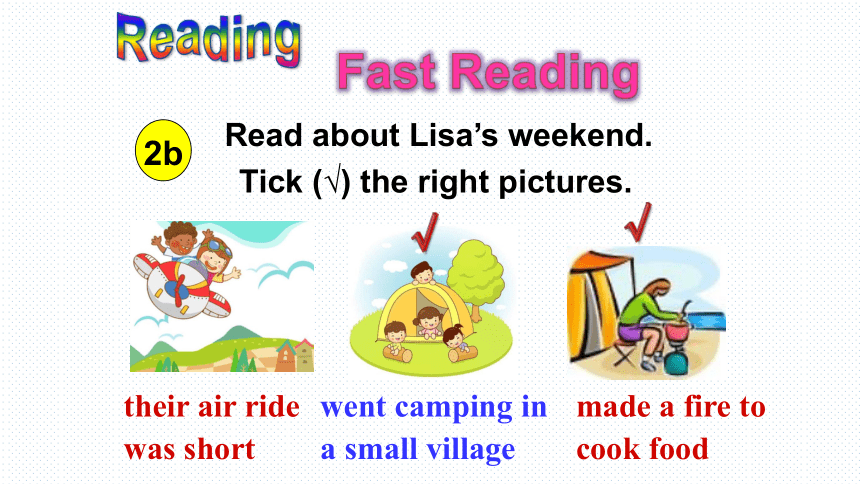
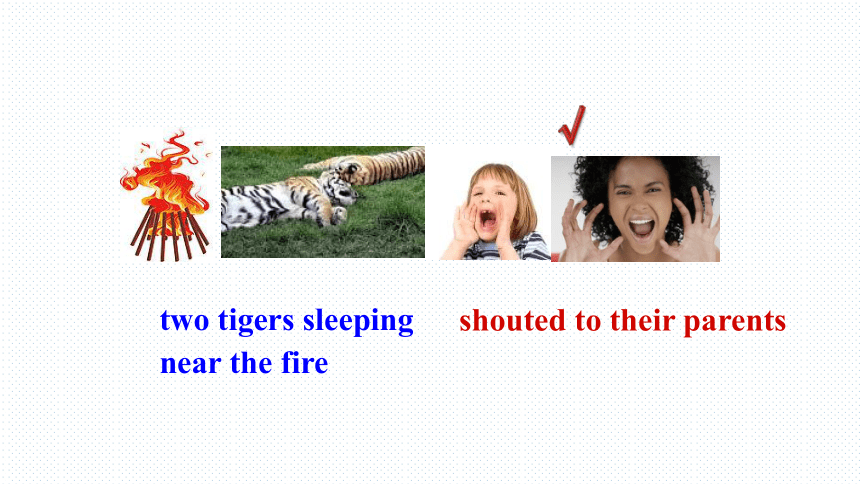
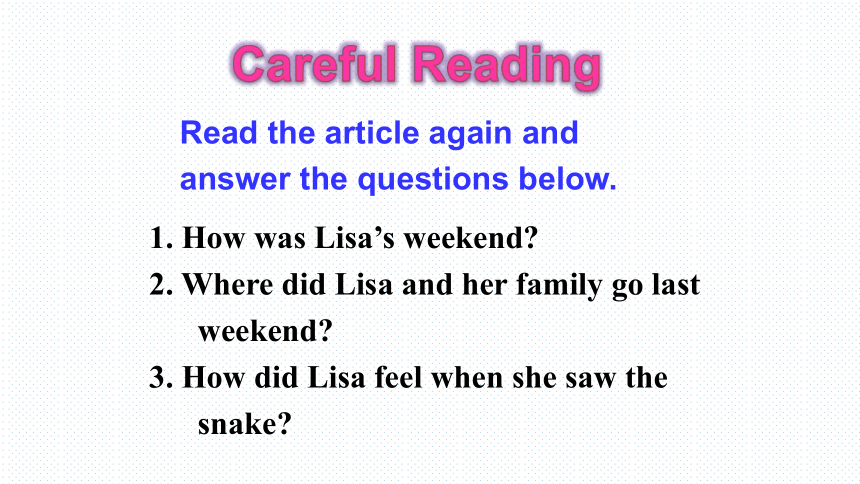
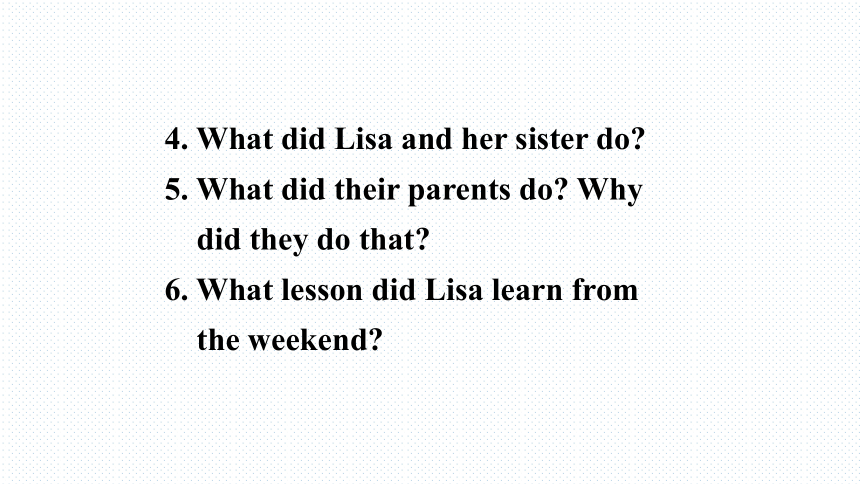
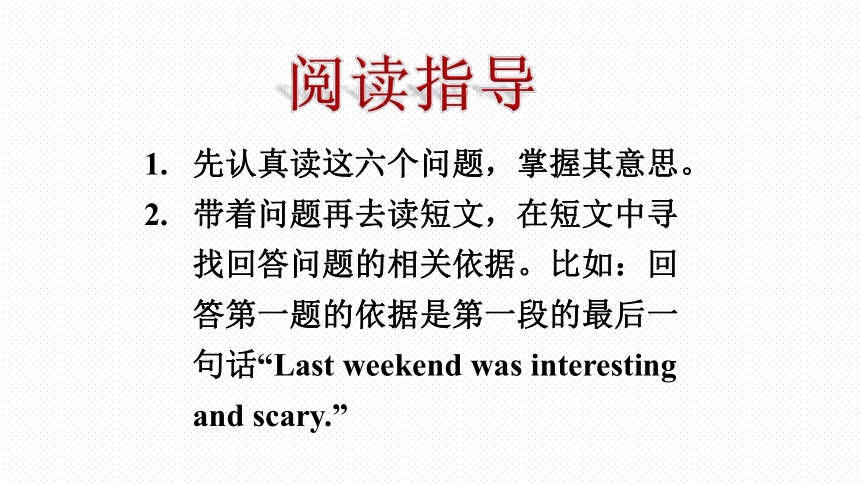
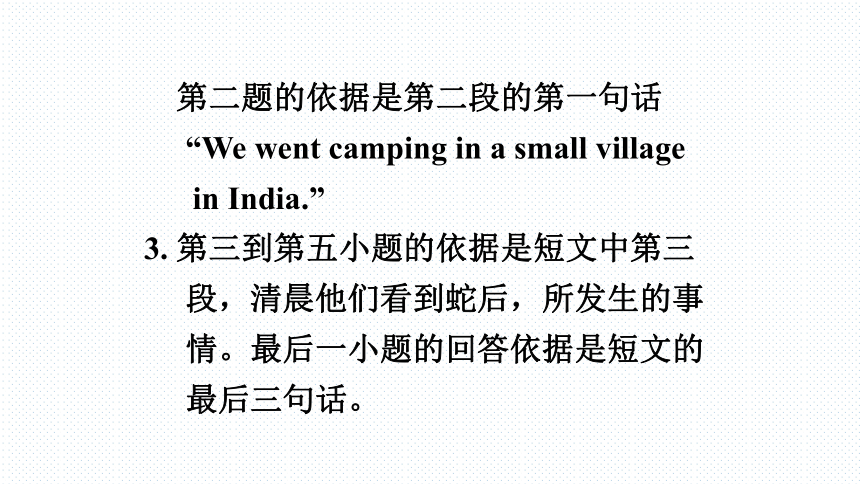
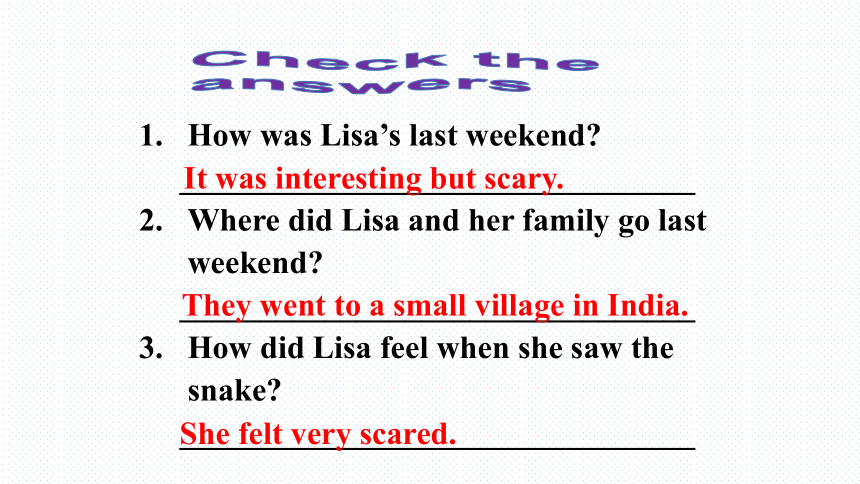
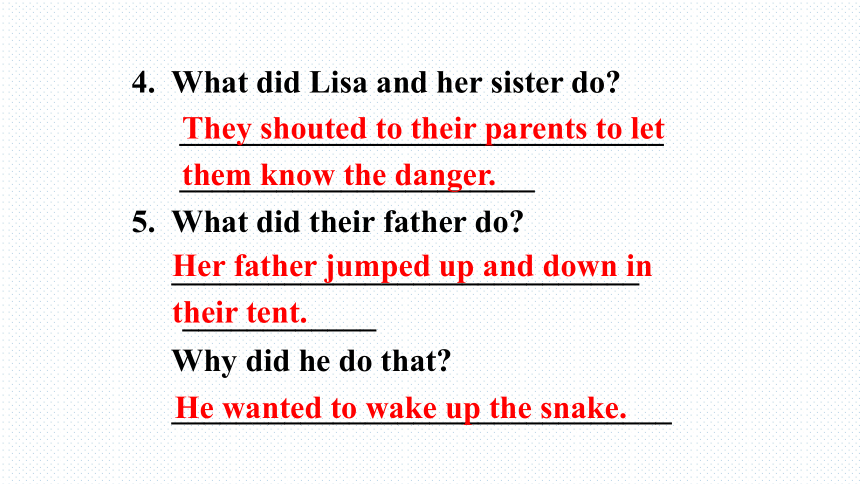
文档简介
课件43张PPT。Unit 12 What did you do
last weekend?Section B
2a-Self Checkput up
举起;搭起tent n. 帐篷put up a tent high school 中学scared adj. 惊慌的wake ... up 把......弄醒New wordsspiderwolfbearmousetigerlionsnake What kinds of animals are people sometimes afraid of? Why? Make a list.I think people are afraid of tigers, lions and snakes because they’re scary. 2a Read about Lisa’s weekend. Tick (√) the right pictures. ReadingFast Readingtheir air ride was shortwent camping in a small villagemade a fire to cook food√2b√shouted to their parents two tigers sleeping near the fire √Careful ReadingRead the article again and answer the questions below.1. How was Lisa’s weekend?
2. Where did Lisa and her family go last weekend?
3. How did Lisa feel when she saw the snake?4. What did Lisa and her sister do?
5. What did their parents do? Why did they do that?
6. What lesson did Lisa learn from the weekend? 先认真读这六个问题,掌握其意思。
带着问题再去读短文,在短文中寻找回答问题的相关依据。比如:回答第一题的依据是第一段的最后一句话“Last weekend was interesting and scary.” 第二题的依据是第二段的第一句话“We went camping in a small village
in India.”
3. 第三到第五小题的依据是短文中第三段,清晨他们看到蛇后,所发生的事情。最后一小题的回答依据是短文的最后三句话。How was Lisa’s last weekend?
________________________________
Where did Lisa and her family go last weekend?
________________________________
How did Lisa feel when she saw the snake?
________________________________She felt very scared. It was interesting but scary. They went to a small village in India. Check the answers4. What did Lisa and her sister do?
______________________________
______________________
5. What did their father do?
_____________________________ ____________
Why did he do that?
_______________________________Her father jumped up and down in their tent. He wanted to wake up the snake. They shouted to their parents to let them know the danger.6. What lesson did Lisa learn from the weekend?
________________________________ __________________________________________________Snakes don’t have ears but they can feel things moving. It’s important not to go near a snake. ___ snake went into the forest
___ put up our tents and cooked food
___ learned a useful lesson
___ saw a snake and shouted to parents for help Put the phrases in order according to the passage. The use them to retell the story. Reading2c___ snakes can’t hear but feel things moving
___ my dad jumped up and down in his tent
___ took a bus to a small village in India
___ told stories under the moon, then went to sleep认真阅读八个句子,了解句子意思,掌握它们所指代的八个事件:蛇进入森林中;撑起帐篷,做饭;学到一条有用的教训;看到一条蛇向父母求助;蛇听不到声音但能感觉到事物的移动;我的爸爸在帐篷里跳上跳下;乘公共汽车去印度的一个小村庄;在月光下讲故事,然后睡觉。阅读指导 2. 带着这八个小事件,再去反复读短文,分析这八个事件发生的时间先后,然后将它们排成正确的顺序。最后,再按所排列的顺序读一遍这八句话,确保顺序正确。___ snake went into the forest
___ put up our tents and cooked food
___ learned a useful lesson
___ saw a snake and shouted to parents for help
___ snakes can’t hear but they can feel things moving24Check the answers678___ my dad jumped up and down in his tent
___ took a bus to a small village in India
___ told stories under the moon, then went to sleep1351. My sister finished high school two weeks ago.
two weeks ago “两星期前”,一段时间 + ago意为“多长时间之前”,是表达过去的时间。它常与一般过去时态连用。如:
三天前,我们参观了自然历史博物馆。
We visited the Natural History Museum
three days ago.
【辨析】before 意为“在……之前”,Language points 其后可以跟一个时间的点;表示“在某 个时间点之前”,但不一定用于一般过去时态。如:
我常在七点钟前去上学。
I usually go to school before seven.
此外,before也可以单独用,意为“以前”,可用于一般过去时态中。如: 以前我不知道那件事情。
I didn’t know that before.
2. There we put up our tents and ...
put up 意为“搭起;举起”,如:
让我们将帐篷搭起来吧。
Let’s put up the tent.
如果你有什么问题,请举起手来。
If you have any questions, please put up your hands. 3. I was so tired that I went to sleep early.
句中so ... that ...?的意思是“如此……
以至于……”。如:
He is so young that he can’t look after
himself.
他如此小以至于不能照顾自己。
【运用】将下面的句子翻译成英语。
他如此忙以至于没有吃午饭。
_________________________________He was so busy that he didn’t have lunch. 4. My dad started to jump up and down in their tent.
start 作动词,可意为“开始;着手”。常用结构为start to do sth.和start doing sth. (开始做某事)。如:
I started to do / doing my homework at 5:30.
我五点半开始做作业的。【运用】
将下面的句子翻译成英语。
你昨天什么时候开始做晚饭的?
__________________________________________________________When did you start to cook / cooking dinner yesterday? 5. This woke the snake up and it moved into the forest near the lake.
wake up 唤醒; 后面可以跟名词或代词; 跟名词时可以放在wake up的后面或中间; 但是如果是跟代词的话应放于 wake up 的中间。如: 早上你常什么时候醒来?
When do you usually wake up?
不要如此大声说话,你会将他们吵醒。
Don’t speak so loud. You’ll wake them up. ago tent surprise moon scared move start into1. She went ____ the kitchen to cook some food.
2. The ______ circles (围绕) the earth every 28 days.
3. They came to visit China two days ____.
4. Do you know how to put up a ____? tentintoagomoon选词填空。Exercise5. She got a great _________ when she got the Iphone 5.
6. My grandparents _______ to the countryside last year. They lived with my uncle in a village.
7. She _______ to learn English when she was ten.
8. She was really ______ to cross the rope way.surprisemovedstartedscaredSection B
3a-Self CheckUnit 12What did you do last weekend?Look at the pictures below. What did they do last weekend?Warm-up看图补全对话。A: How ____ your last weekend?
B: It was great.
A: _______ did you go?
B: I went to the _____.
A: _____ did you go _____?
B: I went with my classmate.
A: ______ did you do there?
B: We _____ ________ and _____ some photos.
wasWhereWho withparkWhatwent boating took— Hi, Li Lei. _____ ____ your weekend?
— Not bad. I _____ ___ the farm, and ____ a big ______.
— Really? Sounds ___________.
— What did you do, Wu Lin?
— Well. I _____ ________ with my friends in the afternoon.
And I _______ ___ late to do my __________ last night.
How wassawwent to sheepinterestingwent boatinghomeworkstayed up play chessThey played chess. go to the mountainsmountainmountainsHe went to the mountains.What did you do last weekend?3a Look at the pictures and complete the passage. I had a busy weekend. On Saturday morning, I . In the afternoon, I . It was a little difficult. On Saturday night, I stayed at home and _______________ cook dinner.
On Sunday morning, I ________________. I read a book about history. Then in the afternoon, I ___________ with my friends. On Sunday night, I . I saw an interesting talk show.cleaned my roomdid my homeworkhelped my momwent to the libraryplayed soccerwatched TV3b Write about what you did last weekend.Last weekend was fun. On Saturday morning, I went shopping at the supermarket with my mother and then we had lunch at home. After lunch, I helped my father with some housework. Later in the afternoon, I played volleyball with my friends at the park. On Sunday morning, I wrote a letter in English to my pen pal. Then I had lunch with my friends at a restaurant near our home. In the evening, I watched a movie with my parents.Self Check1 Complete the phrases. Then use some of them in the past forms to write a story.gogoeattakekitecowbyfor2 Complete the conversation.A: I had a school trip last week.
B: Really. _____________________ (go)?
A: I visited the fire station.
B: ___________________________ (go with)?
A: I went with my classmates.
B: ___________________________ (do)?
A: We watched the firefighters work. What an interesting job they have!
B: ___________________________ (learn anything)?
A: Sure. We learned how to call the fire station and what to do when there is a fire.Where did you goWho did you go withWhat did you doDid you learn anythingⅠ. 用所给动词的正确形式填空1. Now he _____ (be) in Beijing. But last week
he _____ (be) in the USA.
2. Tina and Judy _____ (be) happy last weekend.
Now they _____ (be) at school.
3. She _____ (like) dogs very much. And she
gives it things to eat.
4. I _____ (do) my homework last Friday.
5. He often ________ (watch) TV at home.
Of course he ________ (watch) TV last night.iswaswerearelikesdidwatcheswatchedExerciseⅡ. 单项选择1. —What did they do over the weekend?
— They _________ to a movie.
A. went B. go C. gone
2. What ______ he _____ over the weekend?
A. do, did B. did, did C. did, do
3. — How ____ your weekend?
— Not too bad. I stayed home and watched TV. A. was B. were C. is
4. — Can’t you hear ______?
— No, I can hear _______.
A. anything, nothing B. anything, something
C. something, something
A C A A 1.总结已经学习过的一些文体活动类的词组,看谁总结的最多。
2.假如上个周末,你们学校组织了一次学校旅行活动。请写一则小作文来记叙你的学校旅行的情况。Homework
last weekend?Section B
2a-Self Checkput up
举起;搭起tent n. 帐篷put up a tent high school 中学scared adj. 惊慌的wake ... up 把......弄醒New wordsspiderwolfbearmousetigerlionsnake What kinds of animals are people sometimes afraid of? Why? Make a list.I think people are afraid of tigers, lions and snakes because they’re scary. 2a Read about Lisa’s weekend. Tick (√) the right pictures. ReadingFast Readingtheir air ride was shortwent camping in a small villagemade a fire to cook food√2b√shouted to their parents two tigers sleeping near the fire √Careful ReadingRead the article again and answer the questions below.1. How was Lisa’s weekend?
2. Where did Lisa and her family go last weekend?
3. How did Lisa feel when she saw the snake?4. What did Lisa and her sister do?
5. What did their parents do? Why did they do that?
6. What lesson did Lisa learn from the weekend? 先认真读这六个问题,掌握其意思。
带着问题再去读短文,在短文中寻找回答问题的相关依据。比如:回答第一题的依据是第一段的最后一句话“Last weekend was interesting and scary.” 第二题的依据是第二段的第一句话“We went camping in a small village
in India.”
3. 第三到第五小题的依据是短文中第三段,清晨他们看到蛇后,所发生的事情。最后一小题的回答依据是短文的最后三句话。How was Lisa’s last weekend?
________________________________
Where did Lisa and her family go last weekend?
________________________________
How did Lisa feel when she saw the snake?
________________________________She felt very scared. It was interesting but scary. They went to a small village in India. Check the answers4. What did Lisa and her sister do?
______________________________
______________________
5. What did their father do?
_____________________________ ____________
Why did he do that?
_______________________________Her father jumped up and down in their tent. He wanted to wake up the snake. They shouted to their parents to let them know the danger.6. What lesson did Lisa learn from the weekend?
________________________________ __________________________________________________Snakes don’t have ears but they can feel things moving. It’s important not to go near a snake. ___ snake went into the forest
___ put up our tents and cooked food
___ learned a useful lesson
___ saw a snake and shouted to parents for help Put the phrases in order according to the passage. The use them to retell the story. Reading2c___ snakes can’t hear but feel things moving
___ my dad jumped up and down in his tent
___ took a bus to a small village in India
___ told stories under the moon, then went to sleep认真阅读八个句子,了解句子意思,掌握它们所指代的八个事件:蛇进入森林中;撑起帐篷,做饭;学到一条有用的教训;看到一条蛇向父母求助;蛇听不到声音但能感觉到事物的移动;我的爸爸在帐篷里跳上跳下;乘公共汽车去印度的一个小村庄;在月光下讲故事,然后睡觉。阅读指导 2. 带着这八个小事件,再去反复读短文,分析这八个事件发生的时间先后,然后将它们排成正确的顺序。最后,再按所排列的顺序读一遍这八句话,确保顺序正确。___ snake went into the forest
___ put up our tents and cooked food
___ learned a useful lesson
___ saw a snake and shouted to parents for help
___ snakes can’t hear but they can feel things moving24Check the answers678___ my dad jumped up and down in his tent
___ took a bus to a small village in India
___ told stories under the moon, then went to sleep1351. My sister finished high school two weeks ago.
two weeks ago “两星期前”,一段时间 + ago意为“多长时间之前”,是表达过去的时间。它常与一般过去时态连用。如:
三天前,我们参观了自然历史博物馆。
We visited the Natural History Museum
three days ago.
【辨析】before 意为“在……之前”,Language points 其后可以跟一个时间的点;表示“在某 个时间点之前”,但不一定用于一般过去时态。如:
我常在七点钟前去上学。
I usually go to school before seven.
此外,before也可以单独用,意为“以前”,可用于一般过去时态中。如: 以前我不知道那件事情。
I didn’t know that before.
2. There we put up our tents and ...
put up 意为“搭起;举起”,如:
让我们将帐篷搭起来吧。
Let’s put up the tent.
如果你有什么问题,请举起手来。
If you have any questions, please put up your hands. 3. I was so tired that I went to sleep early.
句中so ... that ...?的意思是“如此……
以至于……”。如:
He is so young that he can’t look after
himself.
他如此小以至于不能照顾自己。
【运用】将下面的句子翻译成英语。
他如此忙以至于没有吃午饭。
_________________________________He was so busy that he didn’t have lunch. 4. My dad started to jump up and down in their tent.
start 作动词,可意为“开始;着手”。常用结构为start to do sth.和start doing sth. (开始做某事)。如:
I started to do / doing my homework at 5:30.
我五点半开始做作业的。【运用】
将下面的句子翻译成英语。
你昨天什么时候开始做晚饭的?
__________________________________________________________When did you start to cook / cooking dinner yesterday? 5. This woke the snake up and it moved into the forest near the lake.
wake up 唤醒; 后面可以跟名词或代词; 跟名词时可以放在wake up的后面或中间; 但是如果是跟代词的话应放于 wake up 的中间。如: 早上你常什么时候醒来?
When do you usually wake up?
不要如此大声说话,你会将他们吵醒。
Don’t speak so loud. You’ll wake them up. ago tent surprise moon scared move start into1. She went ____ the kitchen to cook some food.
2. The ______ circles (围绕) the earth every 28 days.
3. They came to visit China two days ____.
4. Do you know how to put up a ____? tentintoagomoon选词填空。Exercise5. She got a great _________ when she got the Iphone 5.
6. My grandparents _______ to the countryside last year. They lived with my uncle in a village.
7. She _______ to learn English when she was ten.
8. She was really ______ to cross the rope way.surprisemovedstartedscaredSection B
3a-Self CheckUnit 12What did you do last weekend?Look at the pictures below. What did they do last weekend?Warm-up看图补全对话。A: How ____ your last weekend?
B: It was great.
A: _______ did you go?
B: I went to the _____.
A: _____ did you go _____?
B: I went with my classmate.
A: ______ did you do there?
B: We _____ ________ and _____ some photos.
wasWhereWho withparkWhatwent boating took— Hi, Li Lei. _____ ____ your weekend?
— Not bad. I _____ ___ the farm, and ____ a big ______.
— Really? Sounds ___________.
— What did you do, Wu Lin?
— Well. I _____ ________ with my friends in the afternoon.
And I _______ ___ late to do my __________ last night.
How wassawwent to sheepinterestingwent boatinghomeworkstayed up play chessThey played chess. go to the mountainsmountainmountainsHe went to the mountains.What did you do last weekend?3a Look at the pictures and complete the passage. I had a busy weekend. On Saturday morning, I . In the afternoon, I . It was a little difficult. On Saturday night, I stayed at home and _______________ cook dinner.
On Sunday morning, I ________________. I read a book about history. Then in the afternoon, I ___________ with my friends. On Sunday night, I . I saw an interesting talk show.cleaned my roomdid my homeworkhelped my momwent to the libraryplayed soccerwatched TV3b Write about what you did last weekend.Last weekend was fun. On Saturday morning, I went shopping at the supermarket with my mother and then we had lunch at home. After lunch, I helped my father with some housework. Later in the afternoon, I played volleyball with my friends at the park. On Sunday morning, I wrote a letter in English to my pen pal. Then I had lunch with my friends at a restaurant near our home. In the evening, I watched a movie with my parents.Self Check1 Complete the phrases. Then use some of them in the past forms to write a story.gogoeattakekitecowbyfor2 Complete the conversation.A: I had a school trip last week.
B: Really. _____________________ (go)?
A: I visited the fire station.
B: ___________________________ (go with)?
A: I went with my classmates.
B: ___________________________ (do)?
A: We watched the firefighters work. What an interesting job they have!
B: ___________________________ (learn anything)?
A: Sure. We learned how to call the fire station and what to do when there is a fire.Where did you goWho did you go withWhat did you doDid you learn anythingⅠ. 用所给动词的正确形式填空1. Now he _____ (be) in Beijing. But last week
he _____ (be) in the USA.
2. Tina and Judy _____ (be) happy last weekend.
Now they _____ (be) at school.
3. She _____ (like) dogs very much. And she
gives it things to eat.
4. I _____ (do) my homework last Friday.
5. He often ________ (watch) TV at home.
Of course he ________ (watch) TV last night.iswaswerearelikesdidwatcheswatchedExerciseⅡ. 单项选择1. —What did they do over the weekend?
— They _________ to a movie.
A. went B. go C. gone
2. What ______ he _____ over the weekend?
A. do, did B. did, did C. did, do
3. — How ____ your weekend?
— Not too bad. I stayed home and watched TV. A. was B. were C. is
4. — Can’t you hear ______?
— No, I can hear _______.
A. anything, nothing B. anything, something
C. something, something
A C A A 1.总结已经学习过的一些文体活动类的词组,看谁总结的最多。
2.假如上个周末,你们学校组织了一次学校旅行活动。请写一则小作文来记叙你的学校旅行的情况。Homework
同课章节目录
- Unit 1 Can you play the guitar?
- Section A
- Section B
- Unit 2 What time do you go to school?
- Section A
- Section B
- Unit 3 How do you get to school?
- Section A
- Section B
- Unit 4 Don't eat in class.
- Section A
- Section B
- Unit 5 Why do you like pandas?
- Section A
- Section B
- Unit 6 I'm watching TV.
- Section A
- Section B
- Review of Units 1-6
- Unit 7 It's raining!
- Section A
- Section B
- Unit 8 Is there a post office near here?
- Section A
- Section B
- Unit 9 What does he look like?
- Section A
- Section B
- Unit 10 I'd like some noodles.
- Section A
- Section B
- Unit 11 How was your school trip?
- Section A
- Section B
- Unit 12 What did you do last weekend?
- Section A
- Section B
